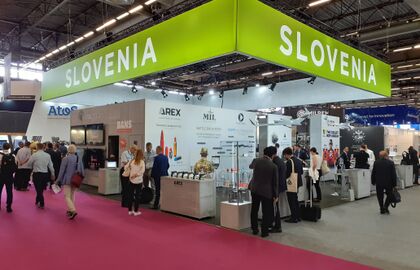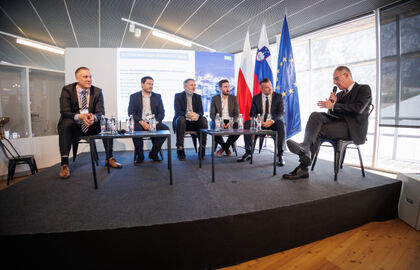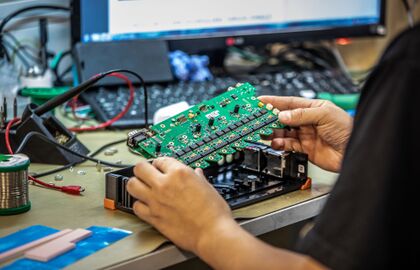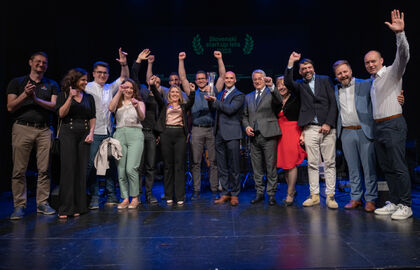Artificial intelligence and blockchain technologies count among the most disruptive technologies of our time. Slovenia is a prolific player in both areas. The Jozef Stefan Institute, the leading national scientific institution, has played a pioneering role in the development of artificial intelligence and counts among the top AI research facilities on the planet. Slovenia, with its tech savvy and well-educated citizens, is home to a bustling start-up ecosystem, particularly focused on blockchain technology. Slovenia’s digital landscape also features a wide network of diverse niche-oriented companies, ranging from software for advanced measurement systems, popular apps, IoT solutions for smart homes and cities, to blockbuster video games. Slovenia’s ICT SMEs enjoy an excellent track record, in line with the nation’s “Green, Creative and Smart” development strategy.
According to the European Commission’s EU Blockchain Observatory Report, Slovenia is one of the European and global leaders in blockchain technology. In the all-time best year of 2017, start-up companies from the young nation with a population of merely 2 million attracted over 5 percent of the total capital invested in blockchain tech globally.
Scientists from the Institute Josef Stefan (IJS) began working on artificial intelligence solutions in the early 1970’s. In the beginning, IJS focused mostly on heuristic algorithms and machine learning. In 1981 the Faculty of Electrical Engineering formed its Laboratory for Artificial Intelligence.
Slovenia was among the 15 founding members of the Global Partnership on Artificial Intelligence. It is a clear indicator of the country’s important role in AI development, as Slovenia is by far the smallest of the founding member nations. Slovenia also hosts the headquarters of the UNESCO International Research Centre for Artificial Intelligence. The IJS, together with Microsoft, is a key partner in the OECD’s AI Observatory, a system which enables global monitoring of AI developments.
10 institutions, 30 research groups, and over 200 researchers work on artificial intelligence related projects in a country of 2 million. Their research focus is centered on areas like semantic search and enrichment, multimodal data analyses, complex visualization tools, and machine perception systems. IJS’ experts also work on integrated wireless sensor systems, enhanced by semantic technologies. Other groups explore problems related to argument-based machine learning, inductive logic programming, qualitative reasoning with robotics applications, intelligent robotics, machine learning in medicine, and intelligent tutoring systems.
Slovenia’s ICT industry is a network of highly specialized companies with leading roles in several important niche areas. One of these niches is control software for most complex machines, including nuclear accelerators, telescopes, fusion reactors, and cancer therapy radiology systems. Other niche areas with globally important players include advanced water-cooling systems for computers, lab software for life sciences, labelling and document management systems, image analysis software for medicine, and VR or AR based simulation and testing solutions for various uses including traffic management and military applications. Slovenia’s ICT companies provide both software and hardware for the digital transformation of the telecommunications, transport, public safety, and energy industries. Behind the leading niche SMEs is a vibrant start-up ecosystem with an excellent track record, including the region’s first unicorn: one of Slovenia’s digital entertainment start-up companies has been sold for more than 1 billion US dollars. Digital entertainment, gaming, and in particular casino tech, are a few other areas where several successful Slovenian companies can be found.
The world’s first pocket calculator was developed by Franc Rode, an ethnic Slovenian working for Hewlett Packard. Today, several potential modern day “Rodes” are coming from universities in Ljubljana, Maribor, and Nova Gorica, thanks to their computer science and electro engineering departments. Young, well-educated, out-of-the-box thinking, and multilingual engineers are behind the most successful launches within Slovenia’s dynamic start-up society. The dynamism and global success of these companies is also attracting talent from abroad.
Slovenia’s ICT infrastructure is among the most developed in the region with a 5G network and wide high speed broadband coverage. The latest edition to Slovenia’s high-performance computing (HPC) network is Maribor’s supercomputer, which is among the 50 most powerful in the world (6.9 petaflops). Serving both industry and public sector, the supercomputer is enabling developments in areas like machine learning, artificial intelligence, and high-performance data analytics.











